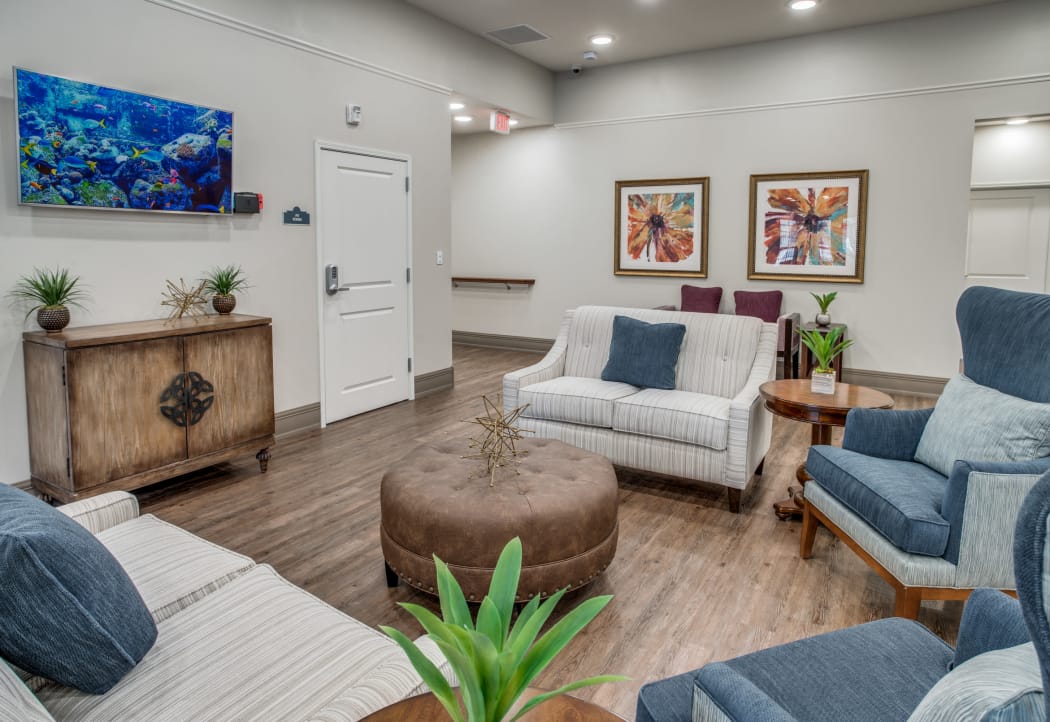Creating a Safe and Supportive Environment: In-Home Memory Care Basics
Developing a safe and nurturing environment for people requiring in-home memory treatment is extremely important to their wellness and top quality of life. From making certain security within the living space to utilizing effective communication techniques and executing memory-friendly design elements, there are important components that add to an all natural care technique. By concentrating on producing a helpful environment that deals with the one-of-a-kind demands of those with memory problems, caretakers can substantially boost the day-to-day experiences of their liked ones.

Safe Living Setting
Producing a hazard-free and secure living setting is paramount when giving at home memory care for people with cognitive problems. Making sure the security of the individual with memory loss is vital to avoid accidents and promote a feeling of well-being.
Additionally, it is necessary to mount safety and security features such as grab bars in washrooms and hand rails along stairs to provide support and protect against mishaps. Furthermore, utilizing technology such as activity sensing units and alarms can notify caretakers if the private wanders or is in distress. Developing a risk-free living setting additionally includes executing strategies to avoid straying, such as making use of door alarms or locks to restrict accessibility to harmful areas. By focusing on security actions and removing possible dangers, caretakers can give a encouraging and protected environment for people with cognitive problems receiving in-home memory care.
Reliable Interaction Methods
Executing tailored interaction approaches is essential in promoting purposeful interactions with individuals with cognitive impairments in the context of at home memory treatment. Reliable interaction plays a critical duty in creating an encouraging environment that enhances the health and high quality of life for individuals with memory problems. When connecting with someone experiencing cognitive decline, it is vital to use clear and straightforward language, maintain a calmness and favorable tone, and provide aesthetic cues to help understanding.
One trick strategy is to practice active listening, revealing compassion, perseverance, and respect during conversations. Non-verbal hints such as face expressions and body movement can also help communicate understanding and support. Furthermore, making use of memory treatment by utilizing or talking about past experiences music and art can tap into long-lasting memories, promoting and stimulating links interaction.
Additionally, including normal regimens and constant interaction patterns can offer a sense of experience and protection for people with memory disabilities. By carrying out these interaction methods, caretakers can establish significant connections and promote a feeling of convenience and rely on the in-home memory care setting.
Memory-Friendly Design
Given the significance of developing a supportive environment for individuals with memory issues via effective communication methods, the unification of memory-friendly design elements in the space becomes critical in maximizing their everyday experiences and overall health. Memory-friendly style focuses on boosting security, comfort, and freedom for individuals with cognitive impairments. Basic adjustments can make a significant distinction, such as utilizing contrasting colors to website here enhance visibility and lower confusion, including clear signage to aid navigating, and minimizing mess to stop sensory overload.
Incorporating familiar components from the individual's past, such as favored items or individual photos, can stimulate favorable memories and create a feeling of familiarity. Furthermore, ensuring sufficient illumination degrees, setting up grab bars in washrooms, and executing non-slip floor covering can help stop drops and injuries. Creating a relaxing and soothing environment with making use of familiar scents, soft structures, and peaceful noises can additionally advertise relaxation and decrease anxiety. By incorporating these memory-friendly design elements, caregivers can give a helpful and risk-free space that enables individuals with memory problems to preserve their self-reliance and top quality of life.
Daily Regimen Preparation
When creating an everyday routine for people with memory problems, mindful preparation is important to sustain their cognitive feature and overall health. Establishing an organized routine can help minimize anxiety, complication, and disorientation often experienced by those with memory problems.
It is important to permit sufficient time for each activity, decreasing the requirement to rush and avoiding possible irritation. Easy jobs like dish times, personal treatment, drug administration, and exercise should be integrated right into the regimen. In addition, incorporating normal durations of rest and leisure can prevent exhaustion and anxiety. Adaptability is key, as some days might call for adjustments based on the individual's state of mind and power degrees. Consistently evaluating and adapting the everyday routine will certainly aid ensure its effectiveness in promoting a favorable and calming environment for individuals with memory difficulties.
Support System Application
Establishing a robust network of supportive people plays a pivotal duty in boosting the top quality of treatment and wellness for individuals requiring memory assistance. Member of the family, friends, medical care specialists, and neighborhood resources can all add to creating a solid support group. Communication among these people is important to make certain that the requirements of the individual with memory challenges are met properly.
Relative are frequently the primary caretakers and form the foundation of the support system. They provide everyday care, psychological support, and friendship. When needed to stop burnout and make sure the ideal possible treatment for their loved one., it is important for household members to look for assistance and break.
Along with family support, entailing healthcare experts such as therapists, doctors, and registered nurses can supply customized treatment and guidance. These experts can use beneficial insights, medical guidance, and help in taking care of the person's problem.

Conclusion
To conclude, producing a risk-free and encouraging setting for individuals with memory treatment needs is necessary for their well-being. By establishing a secure living environment, using efficient communication techniques, including memory-friendly layout components, intending day-to-day regimens, and carrying out a solid assistance system, caregivers can help improve the lifestyle for those with memory loss. These essential components function with each other to produce a nurturing and equipping atmosphere that promotes independence and boosts general high quality of life.
Producing a hazard-free and secure living setting learn this here now is extremely important when supplying in-home memory care for people with cognitive disabilities. By prioritizing safety and security actions and eliminating potential hazards, caretakers can offer a supportive and safe atmosphere for people with cognitive disabilities receiving at home memory care.
Developing a durable network of supportive people plays a critical duty in improving the quality of treatment and health for individuals calling for memory support - Charlotte Memory Care. Interaction among these people is necessary to guarantee that the demands of the private with memory obstacles are satisfied effectively
